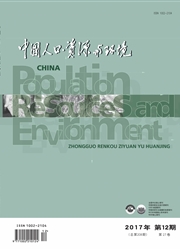

 中文摘要:
中文摘要:
本文基于全球贸易分析一能源模型(GTAP—E)。采用递归动态方法,全面分析美国在2020年针对中国和印度等未实施减排限额的发展中国家实施碳关税对中国碳减排与经济的影响。研究结果表明:美国征收碳关税对我国宏观经济将造成较显著冲击,将导致中国产品贸易流向、贸易结构和生产结构出现显著调整。其中。化学橡胶及塑料制品、机器设备制造、金属冶炼加工产品等隐含碳含量高且对美国市场依赖程度高的部门出口将较大幅度下降,生产遭受较严重的负面影响;此外。与这些产业部门紧密相关的上游资源产品等部门因需求降低也将受到一定的负面影响。但是,其他产业部门则由于生产要素价格下降。生产成本降低.出口和产出将有所增长。虽然美国实施碳关税能降低中国及全球碳排放。但是作用非常有限。基于研究结果。我们提出国家需要防范美国碳关税所导致的贸易和经济风险。并特别注意美国、欧盟和13本等发达国家同时采用碳关税的综合影响。另一方面.中国可以考虑基于“避免双重征税”的原则在国内主动实施碳税,以应对碳关税的实施;同时,需要加强在不同情景下中国主动征收碳税以应对碳关税的相关研究。
 英文摘要:
英文摘要:
Based on Global Trade Analysis Project and Energy model ( GTAP-E), this study adopts a recursive dynamic method to analyze the emission reduction and economic impact of US carbon tariffs on countries that did not commit binding emission quotas, including China and India. The results show that the US carbon tariffs would result in a significant negative impact on China's macro economy. There would be a significant adjustment of China' s trade flows and trade structure, the total export and output of different sectors would experience large adjustment. Exports and output of sectors with higher embodied carbon and larger dependence on the US market would decrease notably, such as Chemical, rubber and plastic sector, Machine equipment sector as well as Ferrous metal processing industry. Meanwhile, output of upstream related sectors would also fall proportionally due to the demand decreasing. However, due to the decline in factor's price and production cost, which would improve the competitiveness of other sectors in the international market, exports and output of these sectors would benefit to increase. Ahhough the implementation of carbon tariffs could reduce global carbon emissions and China' s emission, the magnitude is very limited. According to the research findings, it is important to focus on trade diversion constraints of China' s products when European Union, Japan and other developed countries follow the U.S. carbon tariffs in the future analysis; on the other hand, based on the ' avoidance of double tax' principle, it is suitable for China to impose domestic carbon tax in response to the potential carbon tariffs, therefore, research on China' s initiative to carry out carbon tax under different scenarios also needs to be strengthened.
 同期刊论文项目
同期刊论文项目
 同项目期刊论文
同项目期刊论文
 期刊信息
期刊信息
